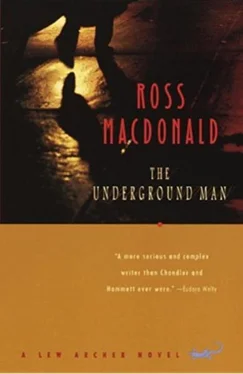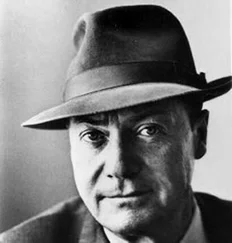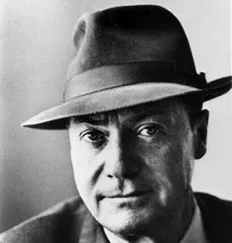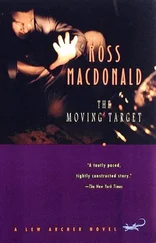“What do you propose to do? Let Susan work it out for herself without any help from you?”
Martha hung her head like a naughty child. “Nobody ever helped me.”
“Maybe I can help you, Mrs. Crandall. Al Sweetner told your husband that he was Susan’s father. But I don’t think he could have been. Not even an Al Sweetner would force his own daughter.”
“Who told you he did that?”
“Susan told me.”
“Do we have to talk about these things?” Her look was reproachful, as if I’d made them real by naming them.
“If Susan could, we can.”
“When did you talk to her?”
“Between the bridge and here.”
“You had no right–”
“The hell I didn’t. She’s been under terrible pressure. She had to let it out some way.”
“Pressure from what?”
“Too many deaths,” I said. “Too many memories.”
Her eyes widened like lenses, as if they were trying to pick up faint light from the past. But all I could see in their centers was my own head reflected in miniature, twice.
“What did Susan tell you?” she said.
“Not very much. She really didn’t intend to tell me anything, but the memories forced their way out. Wasn’t she with you in the Mountain House one night in the summer of 1955?”
“I don’t know what night you’re talking about.”
“The night Leo Broadhurst was shot.”
Her fringed eyelids came down over her eyes. She swayed a little, as if the memory of the shot had wounded her. I held her upright, and felt the warmth of her living flesh on my hands.
“Does Susan remember? How could she? She was only three.”
“She remembers enough. Too much. Was Broadhurst killed?”
“I don’t know. I ran away and left him in the cabin. I was drunk, and I couldn’t get his car to start. But it was gone in the morning, and so was he.”
“What kind of a car was it?”
“A Porsche. A little red Porsche. It wouldn’t start, so I ran away on foot. I forgot all about Susan. I don’t even remember where I went.” She moved away from my hands as if they carried the contagion of that night. “What happened to Susie?”
“Didn’t you go back for her?”
“I did in the morning. I found her asleep in the loft. How could she remember the shooting if she was asleep in the loft?”
“She was awake when it happened, and in the room. She didn’t make it up.”
“Is Leo dead?”
“I think so.”
Martha looked at her daughter, and I turned to look. The girl was watching us intently, less like an actress now than a spectator. Our voices were too low for her to hear, but she seemed to know what we were talking about.
“Does she remember who shot him?” her mother said.
“No. Do you?”
“I never saw who it was. Leo and I were making love, and I was drunk–”
“Didn’t you hear the shot?”
“I guess I did, but I didn’t believe it. You know? I didn’t know he was hurt until I tasted the blood on his face.” Her tongue moved over her lips. “God, what you’re dragging out of me. I thought I’d blanked out on that night. It was the worst night of my life, and I thought that it was going to be the best. We were going to go away, all three of us, and start a new life together in Hawaii. Leo bought the tickets that same day.”
“Was he Susan’s father?”
“I think so. I’ve always thought so. That’s why I went back to him when Lester threw me out. He was the first man I ever let touch me.”
“It wasn’t Al Sweetner? Or Fritz Snow?”
She shook her head rather fiercely. “I was already pregnant when I went to L.A. with them. That was why I went.”
“And you let them take the rap.”
“Leo had a lot to lose. What did they have to lose?”
“Their whole lives.”
She lifted her hands as though to examine them for dirt or scars. A darkness and sadness had risen in her eyes. She ducked her head and hid her face in her hands.
Susan stepped out of her niche as if a spell had broken, and came toward us. Her face was unnaturally bright, like a radiant substance with a short half-life.
“You’re making my mother cry.”
“It won’t do her any harm. She’s human like the rest of us.”
The girl looked at the woman in faint surprise.
I left them together and went out into the hallway. The little boy was lolling on Willie’s knee, stunned by fatigue.
“He’s just about out for the count,” Willie said. “And I’ve got a new bride waiting for me eagerly in San Francisco.”
“Give me a few more minutes. Where’s Miss Storm?”
“In there with her son.” He pointed his thumb at the closed door of the small room under the stairs. “He’s a hardhead, which is why I’m sitting here.”
“What did he do?”
“Tried to fight Harold one-handed. Harold used to play football for the Forty-Niners.”
“Where’s Harold now?”
“Outside watching the house, in case anybody else shows up.” He made a dour face, and gave the boy a gentle poke in the ribs. “Perish the thought, eh, sleepyhead?”
I knocked on the door of the small room. Ellen told me to come in.
She was in the swivel chair. Her son was sitting on the floor beside the safe as if it was a stove that gave no heat. His face was so pale and wretched that it made his red hair and beard seem pasted on. His mouth had a nervous twitch, as if he was biting something, or being bitten.
“This is Mr. Archer,” Ellen said.
With some idea of showing friendly feeling, I asked him how his arm was. He spat on the floor in my direction.
“It’s broken,” Ellen said. “He got it set at a clinic in the Haight-Ashbury. They asked him to check back tomorrow–”
The boy cut off her sentence with a slashing movement of his good arm. “Don’t tell him anything. He was the one that made me lose Ariadne.”
“Sure I did. Also I broke your arm by hitting you on the gun-butt with my head.”
“I should have shot you.”
He was a hardhead, as Willie said. I couldn’t tell how much of the hardness was his own and how much was induced by physical and mental pain.
“He’s in trouble – I guess you know that,” I said to Ellen.
“Do you mean you have to arrest him?”
“That isn’t my job. And it isn’t my job to decide what to do with him. I’m not his father.”
“But you’re working for him, aren’t you?” Jerry said. “If you think you’re going to drag me back to Slobville–”
I turned on him: “Slobville can live without you. If you think the populace is waiting on the docks for your return, think again.”
That silenced him, but I felt a little cheap about talking him down, and a little dishonest. My mind threw up an image of Roger Armistead on the marina float, looking out to sea.
“He won’t go back to his father,” Ellen said. “I’ve been wondering if he couldn’t stay with me, at least for the present. I can arrange to get him the care he needs.”
“Do you think you can handle him?”
“I can give him shelter, anyway. I’ve given shelter to other troubled people.” Her face was open, willing without being eager.
“I don’t know what the law will have to say.”
“How does he stand with the law?”
“It depends on his record, if any.”
We both looked down at Jerry. He sat motionless, except for his twitch, like a sudden old man in the corner.
“Have you ever been arrested?” I said.
“No. I can hardly wait.”
“It isn’t funny. If the authorities wanted to throw the book at you, they could be rough. Taking the yacht could be grand larceny. Taking the boy could be child stealing or kidnaping or contributing to the delinquency of a minor.”
Читать дальше












